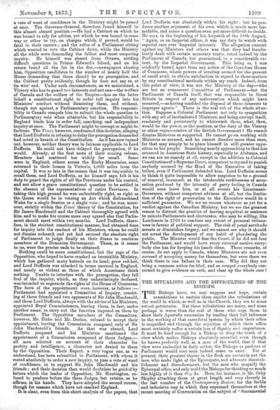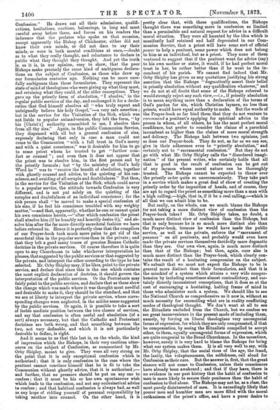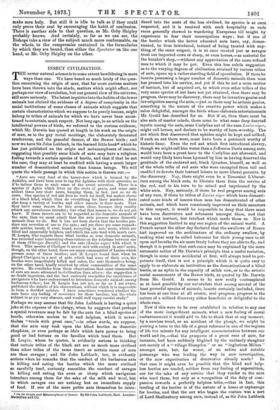THE RITUALISTS AND THE DIFFICULTIES OF THE BISHOPS.
THE Bishops have, we may suppose and hope, •certain consolations to sustain them amidst the tribulations of the world in which, as well as in the Church, they are to some extent potentates. But these tribulations are many, and none perhaps is worse than the zeal of those who urge them to show their Apostolic succession by lending their full influence to the working of that sacerdotal system by which their office is magnified and through the rejection of which their office- must certainly suffer a certain loss of dignity and importance. It must be hard enough for a Bishop to deny the truth of a view which makes Bishops absolutely essential, even though he knows perfectly well, as a man of the world, that if -that view were embodied in daily action, the Bishops as prelates of Parliament would very soon indeed cease to exist. Yet at present their greatest thorns in the flesh are certainly not the men who make light of the Episcopate, and advocate disestab- lishment and disendowment, but the men who magnify the Episcopal office, and only scold the Bishops for thinking so much less highly of it than they do. Here, for instance, is Mr. Orby Shipley attacking them at great length and very cleverly in the last number of the Contemporary Review, for the feeble and indecisive way in which they expressed themselves at the recent meeting of Convocation on the subject of "Sacramental
Confession." He draws out all their admissions, qualifi- cations, hesitations, cautions, balancings, in long and most careful array before them, and forces on his readers the inference that the prelates who spoke on that occasion, except apparently the Bishop of Chichester, either did not know their own minds, or did not dare to say their minds, or were in both mental conditions at once,—doubt as to what they really thought, and reluctance to declare in public what they thought they thought. And yet the truth is, as it is, in our opinion, easy to show, that the poor Bishops make precisely the same kind of ambiguous declara- tions on the subject of Confession, as those who drew up our formularies centuries ago. Nothing can be more care- fully ambiguous than these formularies. They represent the state of mind of theologians who were giving up what they must, and retaining what they could, of the older conceptions. They gave up the priestly form of absolution, "I absolve," in the regular public services of the day, and exchanged it for a decla- ration that God himself absolves all "who truly repent and unfeignedly believe his holy Gospel,"—a very safe assertion ; but in the service for the Visitation of the Sick, which was not liable to popular animadversion, they left the form, "by his [Christ's] authority committed to me, I absolve thee from all thy sins." Again, in the public Communion Service, they dispensed with all but a general confession of sins, expressly declaring that only in case a man could not come to the Communion "with a full trust in God's mercy and with a quiet conscience," was it desirable for him to go to some priest whom he trusted to get "further com- fort or counsel " ; and even then it does not appear that the priest was to absolve him, in the first person and by the priestly formula ; but "by the ministry of God's holy Word he " was to "receive the benefit of absolution, together with ghostly counsel and advice, to the quieting of his con- science, and avoiding of all scruple and doubtfulness." But then, in the service for the Visitation of the Sick, which could never be a popular service, the attitude towards Confession is very different, and is not put solely on the quieting of the scruples and doubtfulness of an individual conscience ; for the sick person shall "be moved to make a special confession of his sins, if he feel his conscience troubled with any weighty matter,"—and that, apparently, whether he can or cannot quiet his own conscience herein,—"after which confession the priest shall absolve him (if he humbly and heartily desire it)," and ab- solve him after the far more directly sacerdotal fashion we have before referred to. Hence it is perfectly clear that the compilers of our Prayer-book took much more pains to get rid of the sacerdotal idea in the popular services than in the private ; and that they left a good many traces of genuine Roman Catholic doctrine in the private services. Of course therefore it is quite open to any Churchman to take whichever interpretation he pleases, that suggested by the public services or that suggested by the private, and interpret the other according to the type he has selected. Mr. Orby Shipley may, if he likes, point to the private service, and declare that since this is the one which contains the most explicit declaration of doctrine, it should govern the interpretation of the public services. Or the Protestants may fairly point to the public services, and declare that as these show the change which was made where it was thought most needful and desirable to make it, they should be the standard, and that we are at liberty to interpret the private service, where corre- sponding changes were neglected, in the milder sense suggested by the public services. Or again, it is possible to take a sort of feeble mediate position between the two classes of services, and say that confession is often useful and absolution (of a sort) always necessary, but that the Catholic and Protestant doctrines are both wrong, and that something between the two, not very definable, and which it is not particularly desirable to define, is right.
And it seems to us that this last is, on the whole, the kind of impression which the Bishops, in their very cautious utter- ances on the subject of Confession, as summarised by Mr. Orby Shipley, meant to give. They were all very strong on the point that it is only exceptional confession which is authorised; that it is only confession in the case where the penitent cannot convince himself that he is fit to take the Communion without ghostly advice, that it is authorised ;— and further, that no pressure should be put on any one to confess ; that it must be his or her own spontaneous wish which leads to the confession, and not any ecclesiastical advice to confess ; and that habitual confession is always bad, as well as any hope of ridding yourself of personal responsibility by taking another into counsel. On the other hand, it is pretty clear that, with these qualifications, the Bishops thought there was something more in confession so limited than a permissible and natural request for advice in a difficult moral situation. They were all haunted by the idea which is manifestly half retained and half deprecated in our Com- munion Service, that a priest will have some sort of official
power to help a penitent, some power which does not belong to him as an individual, but as a priest. They none of them
ventured to suggest that if the penitent went for advice (say) to his own mother or sister, it would, if he had perfect moral trust in her, be rather better than if he went to the in- cumbent of his parish. We cannot find indeed that Mr.
Orby Shipley has given us any quotations justifying his strong assertion that the Bishops "dogmatically assert their belief in priestly absolution without any qualification whatever," and we do not at all doubt that some of the Bishops referred to wouldstrongly reject any such if priestly absolution is to mean anything more than a declaration of the terms of God's pardon for sin, which Christian laymen, no less than priests, would have equal authority to make. But the words of the Prayer-book so far bind them that they do not venture to
recommend a penitent's applying for spiritual advice to the person in whom, of all others, he has the most perfect moral
confidence, but prefer to consider the claims of a parochial incumbent as higher than the claims of mere moral strength and delicacy. The Bishops halt between two opinions, just as does our Prayer-book. They do not, as far as we can see, give in their adherence even to "priestly absolution," and certainly not to "sacramental confession." But they do not go with what Mr. Orby Shipley calls the "disordered imagi- nation " of the present writer, who certainly holds that all that is good in the result of confession can be got out of any layman whose moral nature can be thoroughly trusted. The Bishops cannot be expected to throw over the priestly order quite so unceremoniously. They take part in a service which makes a great deal of show of creating the priestly order by the imposition of hands, and of course, they are apt to regard the priest as something more than a man with a high calling,—high, that is, if it be a real calling,—which is all that we can admit him to be.
But really, on the whole, can we much blame the Bishops for not taking a more distinct view of confession than the Prayer-book takes ? Mr. Orby Shipley takes, no doubt, a much more distinct view of confession than the Bishops, but that is only because he is so much more distinct also than the Prayer-book, because he would have made the public service, as well as the private, enforce the "sacrament of penance" on all penitents, and probably would even have made the private services themselves decidedly more dogmatic than they are. Our own view, again, is much more distinct than that of the Bishops ; but then, again, ours also is much more distinct than the Prayer-book, which clearly con- tains the result of a hesitating compromise on the subject. We submit that we must not expect the Bishops to be in general more distinct than their formularies, and that it is the mischief of a system which attains a very wide compre- hension by including sometimes almost contradictory, and cer- tainly directly inconsistent conceptions, that it does so at the cost of encouraging a hesitating, halting frame of mind in those who administer such a system. We should like to see the National Church as comprehensive as it now is, without so much necessity for reconciling what are in reality conflicting modes of theological thought. We don't want at all to see the Ritualists excluded from the Church, but we confess we see great inconvenience in the present mode of including them, namely, by forcing on liberal theologians very uncongenial forms of expression, for which they are only compensated, if that be compensation, by seeing the Ritualists compelled to accept other, to them, equally uncongenial forms of expression, which are quite congenial to the Broad Churchman. In the meantime, however, surely it is very hard to blame the Bishops for being what our system makes them. 4 is all very well to say, with Mr. Orby Shipley, that the social vices of the age, the fraud, the laxity, the voluptuousness, the selfishness, call aloud for Confession as their cure. But the answer is, first, that the great sinners will not come to Confession, unless their consciences have already been awakened ; and that if they have, there is no evidence in our past history that the habit of confession to man is more likely to secure their penitence than the habit of confession to God alone. The Bishops may not be, as a class, the most purely disinterested of men. It is exceedingly likely that poorer men and humbler men are more filled with the moral enthusiasm of the priest's office, and have a purer desire to make men holy. Bat still it is idle to talk as if they could only prove their zeal by encouraging the habit of confession. There is another side to that question, as Mr. Orby Shipley probably knows. And certainly, as far as we can see, the Bishops take a view of the subject much more conformable, on the whole, to the compromise contained in the formularies by which they are bound, than either the Spectator on the one hand, or Mr. Orby Shipley on the other.




































 Previous page
Previous page